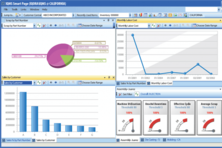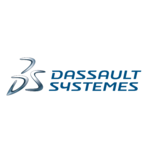Enterprise resource planning, or ERP, software solutions can be used by manufacturing companies to manage and streamline a variety of core business processes. These operations include production, purchasing and inventory management to name a few. For manufacturing companies, in particular, these solutions offer the ability to manage key strategic issues such as resource utilization, operational control and ensuring on-time deliveries. They can also collate and interpret large volumes of data. Since the manufacturing industry’s environment is highly competitive, ERP software helps to regulate and streamline mundane tasks as well as improve a company’s momentum. Through this, these solutions also help to increase overall productivity.
ERP software effectively integrates all of the various processes that make up a manufacturing company’s everyday functions into a single system. This allows each team member of the business to access crucial information through an immediate source that also operates in real-time. As such, these solutions can help facilitate immediate decision-making and quick responses to business opportunities or roadblocks alike.
Manufacturing companies generally deal with a number of business processes that can take up a considerable amount of time, especially when done manually. This includes coordinating with external companies, tracking inventory and delivering products. Without a proper system to accommodate the growing tasks to be dealt with, employees of a company can end up working on tedious activities that don’t help the businesses overall growth and productivity.

 IQMS ERP is a fully-fledged manufacturing ERP solution with modules covering the needs of a wide variety of processes and industries. The solution is perfect for small to medium-sized repetitive and batch process manufacturers.
IQMS ERP is a fully-fledged manufacturing ERP solution with modules covering the needs of a wide variety of processes and industries. The solution is perfect for small to medium-sized repetitive and batch process manufacturers.
Manufacturing companies have a multitude of operational tasks to deal with. Other than passing on vital information to their internal workers and employees, they also have to coordinate with external forces, which involve vendors, suppliers and distributors. Furthermore, tracking orders, managing inventory and delivering products are also a core part of their jobs.
ERP software helps to reduce the clutter and disorganization of these tasks. These solutions allow manufacturing companies to share information with their assets, organize and automate business processes into easy-to-understand formats as well as provide insights into crucial information such as for inventory levels and supply chains.
Now, production is one of the core functions a manufacturing firm focuses on. However, there are still behind-the-scenes operations that focus on producing services and raw materials for interested customers. A popular manufacturing integrated ERP software known as IQMS extends such capabilities through a variety of additional modules. These modules include scheduling, supply chain management (SCM), customer relationship management (CRM) and procurement. With this in mind, most ERP software solutions, in general, provide these same features to speed up operations from across the entire manufacturing process to improve the overall productivity and profitability of the work being done:
With an ERP system, managing different fields of operation becomes less stressful and easier to navigate. These solutions integrate all of the core functions of a business into a single interface, which benefits all users. It also allows users across the organization to have access to accurate, real-time information that further facilitates easily streamlined processes.
Through employing an ERP solution, users are able to keep working on new business opportunities instead of manually running their business from the background. These solutions also help in enabling employees to work on their core responsibilities instead of spending time on menial or repetitive tasks that can be handled by ERP software.
In managing a manufacturing company, specialist functionalities need to be taken into consideration—development, designing, inventory, procurement, finance, sales, and delivery. They play an important role in the cycle of the workflow. As long as these processes are easily automated and streamlined in real-time with the help of an ERP system, the company can focus on more important tasks instead.
Quality control is an important feature in a highly competitive industry. Since ERP solutions are capable of automating and streamlining a range of operational processes, users don’t necessarily have to rely on rechecking things manually. As such, human-based errors can be avoided entirely.
Furthermore, in manufacturing companies especially, defects, returns and product issues can easily be identified and fixed through ERP software. This reduces any hindrances and complications to the overall flow of the company and helps to control the quality being put out.
When it comes to manufacturing, it’s critical to have a well-structured plan involving both raw materials and finished goods. The production of goods and services requires sufficient storage and well-stocked inventory, which can be hard to keep track of. As such, ERP software solutions for manufacturing can often also offer MRP (Material Requirements Planning) capabilities. It should be noted, therefore, that MRP and ERP, while different in their respective fields, can be integrated into a single system—although standalone variants of both exist too. However, MRP needs to be manually inputted to reflect the specific requirements of the business using it.
A manufacturing ERP software solution reduces costs and accelerates operations involved in purchasing and production. This is achieved by satisfying demands on storage, tracking and managing orders from different vendors and suppliers. You can also set schedules as a way to oversee the correct staffing along with their output levels and analyze production activities.
Overall, the software improves the efficiency and effectivity of how you can manage your production and purchasing. Since a myriad of parts and components are required in the products involved, an ERP helps minimize the traffic that comes along with it. As such, the process of tracking down orders and purchases will have significantly improved in speed and organization.
ERP software solutions, once employed by your manufacturing company, provide multiple benefits in different areas of the organization. With the integration of different core functions into a single system able to be accessed by all members of the team, the software has the following core benefits:
With ERP software providing quick solutions, manufacturers can also provide a quicker response to their customers. Time isn’t spent on focusing on mundane activities like manually inputting information or sharing the database with another department. Through the system’s automated feature, efficient productivity during work hours can be observed by the company.
Time is money, as the saying goes. With lesser time spent on manual processes, the lesser cost it has on labor expenses. Furthermore, since worker productivity has increased with ERP software streamlining processes and automating information into a database, fewer errors can be made. The manufacturing firm can, therefore, reduce overall costs with this system.
At the end of the day, customer satisfaction is what every company strives for. ERP software provides an easy to understand IT system to work on production and quicker response time to all inquiries made by clients. These solutions can also oversee quality control, streamlined process scheduling and the on-time delivery of products. Through this, it effectively transforms the everyday operations of manufacturing firms, as well as helping them to adapt ahead of the industry environment and its competitors.